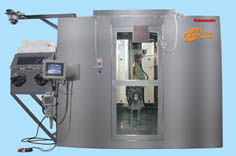Kawasaki to Test World’s First Fully-Automated Robotic System that Simultaneously Cultures Multiple Cell Lines
Dec. 04, 2006
| Tokyo, December 4, 2006 — Kawasaki Heavy Industries, Ltd. announced today that it has developed the first prototype of an automated cell culture system for the tissue engineering industry. Unlike conventional systems that culture a single cell line via partially automated processes, this complete system employs the world’s first secure, fully-automated robotic operations to simultaneously culture mesenchymal stem cell*1 lines for multiple patients. Tissue engineering is a state-of-the-art medical technology for cultivating a patient’s own cells or tissues to restore tissues or organs that have lost the ability to function due to disease or injury. Currently, cells are produced in a GMP*2-compliant cell processing center (CPC) where operators are allowed to handle only a single patient’s cells per chamber in order to prevent contamination. Highly skilled technicians are needed to perform complex manual procedures. The lack of sufficient cell production capabilities due to these factors have been one of the stumbling blocks to realizing the full potential of regenerative medicine. With Kawasaki’s new automated cell culture systems, multiple cell lines can be maintained in each individual chamber during incubation. Individual cells can be taken out and transported to an operating station where cell culture operations such as medium exchange and sub-culturing can be performed. Completely automated operations, including cell loading and removal, that are free of operator intervention, prevent the risk of cross-contamination. Employing the know-how it acquired as an industrial robot manufacturer, Kawasaki successfully installed robotic movements that correspond with the intricate movements of a skilled operator to ensure high-quality and efficient cell culturing as well as superior versatility. The system is also equipped with functions that enable users to monitor cultured cell image data as well as remote monitoring functions. Backed by Kawasaki’s long-fostered production control technologies, each system can be configured to meet specific requirements including production volume, scheduling and managing cell records. This project was planned by Kawasaki as a part of its technological development division’s new market research activities that aim to widely apply Kawasaki’s core technologies in robotics, plant engineering, image processing and production. It is currently underway as a development project commissioned by the Japan Science and Technology Agency (JST). The first prototype has been installed in the CPC at Shinshu University Hospital’s new Advanced Medical Center which opened on December 4 and will be put through a series of evaluation tests. Shinshu University will use the prototype for conducting research on potential applications in the field of cartilage regeneration. After testing, Kawasaki will continue further research and development efforts toward practical applications of robotic cell culture systems in the area of regenerative medicine. *1. Mesenchymal stem cell: Research in cartilage regeneration has been focused on growing and transplanting mesenchymal stem cells derived from bone marrow instead of using cartilage cells. Mesenchymal stem cells can be used to regenerate bone, cartilage, muscle, etc. *2. GMP stands for good manufacturing practice which is a set of standards governing the manufacture and quality control of pharmaceutical and medical products issued by the World Health Organization in 1969. It has been used in Japan since 1976. |






